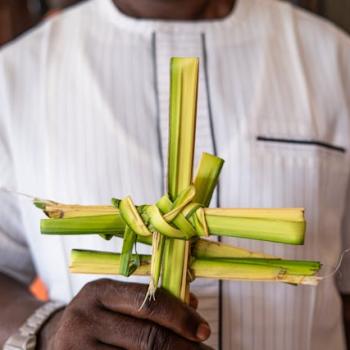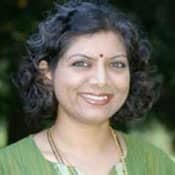Note: This article is part of a special Patheos Symposium, Passing on the Faith: Teaching the Next Generation. Read more perspectives here.
I was recently at a Hindu American Foundation event where I was surrounded by people of many ages and backgrounds, and was excited to discover that someone else had grown up without a temple, just like me! Growing up Hindu in the United States in the '70s meant that learning about the faith was something done at home. I was one of two "brown" children in my suburban Long Island public school, where I had to explain my mother's strange clothing (a sari), and the even stranger markings on our foreheads (bindis), that earned me the nickname "dothead" from my fourth grade crush.
The young people in our midst were surprised and could not imagine life without a temple nearby for celebrating holy days and making connections to the community of faith. Fortunately for them, the generation above mine—mostly immigrants from India—could not imagine raising children without a temple; thus, several hundred temples have been built in the United States over the last several decades, serving as learning centers and places of worship for a community that includes immigrants and "Americans" who have adopted the faith as way of life that embraces pluralism.
When I became a parent nearly eighteen years ago, I realized the importance of having a temple nearby, in order to educate my children in the aspects of the faith that I could not, with my limited knowledge of Sanskrit or understanding of the rituals that mark the milestones of a Hindu life. When we moved our young children to Michigan fifteen years ago, seeking a home near the local Hindu temple was a no-brainer. The annual temple calendar that came with the membership dues typical of American Hindu temples, served as a way to "keep" the holidays, as there are days almost every month to celebrate this deity or that. The treats made as part of the rituals and celebrations helped decide what Indian foods I became adept at making, amidst the tacos, pasta, and pizza in our typically South Indian vegetarian diet. The aunties and uncles I found at the Temple became the elders that bless our children on auspicious occasions, serving as the extended family in the absence of their grandparents hundreds or thousands of miles away.
The Sanskrit, religious education, and classical arts classes that my children took at the temple, as well as the selfless service they provide to the community, have been a key part of their faith formation; they learned the yoga of gnana and karma (knowledge and action) along with the bhakti (devotion) gained from participating in various religious rituals, raising their voices to sing or chant in unison.
But as a family, we have also lived our faith in what we do outside the temple, working for social justice and non-violence. I follow the path of dharma (justice) and seek shanti (peace) as a community activist working for interfaith understanding and advocating for the rights of those who have no voice. After all, parenting is something done by example, by example, by example. I believe that being active in the temple community, along with what we have done outside the house of worship, has provided my children the essence of what it means to be Hindu. As they grow and leave the home, I hope that they—along with their peers—will continue to support the needs of the faith community by supporting the temples we have built and to serve the world we live in by promoting pluralism.
12/2/2022 9:08:55 PM





